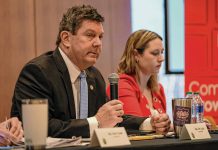An amendment that could provide up to $10 million for a railroad overpass at State Road 11 and Jonathan Moore Pike in Columbus has been placed into a state transportation bill.
During Monday’s Third House legislative session, State Rep. Milo Smith, R-Columbus, told an audience of about 35 people at Columbus City Hall that the amendment was added late last week.
The change to House Bill 1002 allows the Indiana Finance Authority to authorize bonds of up to $10 million for specified railroad-crossing projects.
One possible way of paying back bonds might be through the Tax Incremental Financing (TIF) district already established on the west side of Columbus, Smith said.
An overpass has been suggested for Columbus as one way to offset the impact of additional train traffic that will be coming through the city after next year.
When traffic delays occur as a result of such changes, “it has an impact on the whole community — not just the west side,” Smith said.
The overall cost for the overpass and railroad alignment could be $94 million or more. Multiple sources of funding are being sought at both the state and local level, Smith said.
“Everything is still on the table,” the legislator said Monday.
Gas tax
While House Bill 1002 originally called for a 10-cent-a-gallon gasoline tax increase effective in July, a Senate change adopted last week changes that to a 5-cent increase this year and an additional 5 cents starting next year, Smith said.The increase was proposed after the Indiana Department of Transportation announced it needs an additional $1.2 billion for road and bridge repairs, as well as related infrastructure.
Besides the gas tax increase, lawmakers also want to take $305 million raised through a sales tax and dedicate it to roadwork, Smith said.
Although the House recommends increasing a $1 a pack increase in the cigarette tax to fill that gap, State Sen. Greg Walker, R-Columbus, said many lawmakers are worried now about health care proposals being considered by Congress.
Since Indiana could potentially lose hundreds of millions of dollars in funding from Medicaid cuts, many state senators feel using money from additional cigarette taxes for health care would be a better and more appropriate investment, Walker said.
Although another Senate proposal would add a $5.25 surcharge on every tire purchased in Indiana, Walker said that concept has received a cool reception from his legislative colleagues.
Education spending
The two-year budget now being considered by the Senate on second reading calls for a $350 million increase for school funding, Walker said.Recent changes made in the Senate call for a 2.8 percent increase in K-12 education for the first year, followed by a 2.5 percent increase the second year, the senator said.
The big question is how that money will be distributed throughout all 92 Indiana counties. The basic formula establishes a basic amount of state aid toward each student’s education.
A separate formula called a complexity index determines how much extra should go to districts for children with disabilities or who come from low-income families, Smith said.
Right now, an additional $40 million in complexity grants has been added to the state budget for affected school districts.
But due to misuse in a few cities, Smith is advocating additional oversight to ensure the complexity index is being applied properly to every student.
“We have to make sure nobody is taking advantage of the system,” Smith said.
Most school districts are providing accurate information to obtain complexity grants, Bartholomew Consolidated school board member Bob Abrams said.
Such oversight shouldn’t be necessary for school corporations who are not having financial struggles, however, said Rich Stenner, president of the BCSC school board.
In House Bill 1008, the House has removed a stipulation that the Indiana Department of Workforce Development control monies earmarked for career technical education training, Walker said.
While funding control will remain with the Indiana Department of Education, collaboration will be required largely to ensure training dollars are invested to ensure students seeking training are aligned with hometown career opportunities, Walker said.
“It’s not that we are directing individual students onto a particular (career) track,” Walker said “It’s so that if a student identifies a certain interest in things, we can put the tools in their hands to make their decisions wisely.”
Affordable housing
For supporters of Columbus-based affordable housing developer Housing Partnerships Inc., Smith announced some disappointing news.Senate Bill 559, which would provide a property tax exemption for an affordable rental housing property, will not be given a hearing by the House Ways and Means committee, he said.
Bartholomew is one of a few Indiana counties where that exemption is denied at the county level because local tax boards are allowed to make their own interpretations of the term charitable use.
But Smith did say the House Ways and Means committee chairman said he intends to add language to the budget bill that requires the Department of Local Government Financing to make uniform guidelines, Smith said.
“I know that’s not what you want,” Smith told Thrive Alliance executive director Mark Lindenlaub, whose agency includes Housing Partnerships. “But it’s better than the bill dying for the year.”
Net metering
The Indiana House Committee on Utilities, Energy and Telecommunication voted 8-5 last week to pass a measure that would dramatically reduce the rate solar customers are paid for their excess energy.The measure would reduce the rate paid to net metering customers from the retail rate to the utility’s marginal cost, plus 25 percent.
Earlier provisions stipulating that net metering customers would need to sell all the energy they produce — and buy all of their demand at a higher rate — were eliminated.
But retired Columbus attorney Mike Mullett said the rate still in place has been described as admittedly arbitrary by the bill author. He warned if a process wasn’t used to reach a just and reasonable rate, the state will be violating federal laws on the issue.
But Smith said he believes the basic policy question is whether all Hoosiers should continue to subsidize a relatively small number who have solar panels.
The current bill is intended to allow energy companies to develop self-sustaining and self-supporting hybrid power sources over the next 30 years, Walker said.
[sc:pullout-title pullout-title=”Countdown” ][sc:pullout-text-begin]
Less than three weeks remain in the 2017 Indiana General Assembly session. Unless lawmakers choose to extend the session, the state legislature will adjourn no later than April 22.
Third House sessions, sponsored by the Columbus Area Chamber of Commerce, are held every Monday while the Indiana General Assembly is in session. The 7:30 a.m. meetings are in the Cal Brand Meeting Room at Columbus City Hall, 123 Washington St. They allow residents to learn where their representatives stand on matters before the state legislature.
[sc:pullout-text-end]




